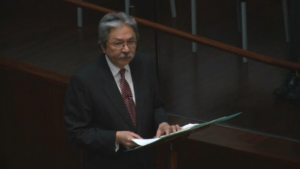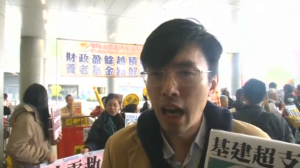HONG KONG, China (Reuters) — Political tensions in Hong Kong are hurting the economy, said the city’s financial secretary in his annual budget speech on Wednesday (February 24), as he rolled out a multi-billion dollar package of sweeteners to bolster growth hit by a slowdown in China.

In unusually blunt comments for a budget address, John Tsang said “political volatility” was threatening to undermine the economy and warned disputes would intensify ahead of legislative elections this year pitting the city’s democratic opposition against pro-Beijing and pro-establishment political parties. He said the conflicts must be resolved.
“We anticipate that political disputes will only intensify over the coming months. Politics and economics are closely intertwined. Political volatility will unavoidably impact our economy. It is the duty of the government to take on challenges in our society,” Tsang said.
In the wake of a night-long riot earlier this month that saw protesters fight pitched street battles with police, Tsang warned Hong Kong could face “even greater chaos”.
“We need to truly understand the issues, more importantly, we need to have the determination to resolve these conflicts. If we should allow the situation to get worse, what lies in store for Hong Kong will be even greater chaos, and our future generations will grow up in the midst of hatred and malice,” Tsang said.
Hong Kong is a special administrative region of China that returned from British to Chinese rule in 1997 under a “one country, two systems” framework that guarantees broad freedoms and autonomy.
Tsang expects GDP growth to slow to 1-2 percent in 2016. Economic growth for 2015 came in at 2.4 percent, in line with the government’s estimate, and compared with a median 2.3 percent forecast by six economists surveyed by Reuters.
“The local economy is laden with risks in the year ahead. The outlook is far from promising,” Tsang said.
After a stint of healthy surpluses, including HK$30 billion ($3.86 billion) for the current financial year, Tsang said he expected the city to run up deficits in its consolidated accounts for two years starting from 2018.
Among measures to boost growth were a personal tax cut up to HK$20,000 ($2575) for some city residents, some property rate waivers and a public housing supply target of 280,000 units for 10 years up to 2026.
Hong Kong home prices remain among the highest in the world.
Right before Tsang arrived at the Legislative Council to deliver his address, a few dozen protesters outside the building chanted slogans reflecting a slew of demands, from implementing a universal pension scheme to giving more “sweeteners” to the public.
One of the protest leaders, Chairman of the pan-democratic League of Social Democrats Avery Ng, said sweeteners would not be enough to alleviate the public’s anger.

“I do not think so. Because Hong Kong is facing structural problems. Unless we have true universal suffrage, and also we can use our surpluses to have a genuine reform in terms of the social welfare system, as well as the education system, otherwise a one-time sweetener wouldn’t help alleviate the anger of Hong Kong people,” Ng said.
The recent riot, slowness in rolling out major infrastructure projects such as a rail link with China and HSBC Holdings’ recent shunning of the city for its headquarters, are also weighing on Hong Kong and have tarnished its reputation as a law-abiding and efficient global business hub.
The Hong Kong government faces a big test and analysts are looking for signs of long-term economic policies and strategic vision, instead of short-term economic sweeteners.
The retail and tourism sectors, important drivers of the local economy, have also been hit hard by a drop in mainland Chinese tourists.







